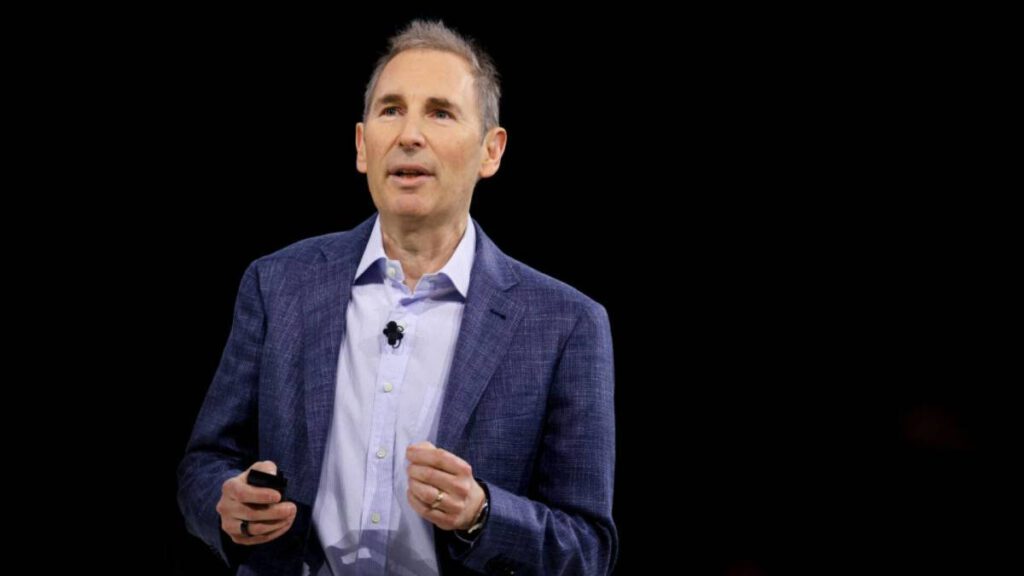AI development hasn’t exactly been a level playing field, but a recent move by Amazon may have just made it a lot more uneven.
Behind the scenes, Amazon’s (AMZN) been brewing a high-impact shift, covering data access, competitive strategy, and the intricate balance between innovation and platform control.
💵💰Don’t miss the move: Subscribe to TheStreet’s free daily newsletter💰💵
Though the move wasn’t flashy, it’s strategic. It compels other tech players to follow suit, while forcing fellow tech giants to adapt or fall behind.
In a world where every AI breakthrough depends on what we can see, scrape, or simulate, Amazon’s powerful new position could become a serious bottleneck.
Image source: Nagle/Bloomberg via Getty Images
AI rivalry heats up in Big Tech
Since early 2025, the AI battle has swung from hype to hardball.
That involves data walls going up, GPU/ASIC races ahead, as search and shopping get refactored. On top of that, capex has turned into an arms race and a full-blown AI talent war.
Related: Temu’s US shoppers just caught a massive break from Trump’s tariff heat
Five big themes of the AI war:
- Data lock-in: Platforms walling off training data.
- Chip supremacy: GPUs compared to in-house/custom chips.
- Distribution wars: AI search/shopping effectively reshaping traffic levels.
- Capex shock: Record levels of spending to develop AI “gigafactories.”
- Talent wars: Megabuck poaching from Big Tech heavyweights.
Data lock-in. As discussed earlier, Amazon is blocking more third-party AI crawlers, part of a broader push to keep its valuable marketplace data inside its retail-media moat.
Chip supremacy. Nvidia is still setting the pace, with Q2 Fiscal Year 2026 sales of $46.7 billion (56% higher on a year-over-year basis) and Data Center sales at $41.1 billion.
Blackwell data-center revenue shot up 17% quarter-over-quarter, despite Nvidia not logging in any H20 sales to China.
Distribution wars. Google’s AI Overviews are effectively reshaping how people get their answers, and recent reports suggest that premium publishers have seen 1%–25% drops in Google referral traffic post-rollout.
Capex shock. Hyperscalers are guiding for $300 billion to $350 billion in 2025 AI/data-center capex, with forecasts rising to a whopping $400 billion in 2026, resulting in stronger barriers to entry.
Talent wars. Meta is leading the charge with eye-popping packages, up to $300 million over four years for elite hires (and claims of $100 million bonuses), with poaching from Apple/OpenAI.
It seems that compensation debates, poaching, and retention drama are now critical variables in the AI arms race.
Related: JetBlue’s AI move could solve a massive problem for passengers
Amazon tightens its AI bot blockade across platform
Amazon is tightening its data gates and layering more potent AI web-crawlers from Meta, Google, Huawei, Mistral, and others to its robots.txt blocklist.
The move aims to curb web crawlers from scraping marketplace pages in feeding AI models, effectively signaling a more watertight walled-garden stance.
It started with Amazon locking down against Google’s AI shopping agents in late July, per The Information’s July 30 report.
More News:
- Top analyst flags major AI shift in AMD, reboots price target
- Billionaire George Soros supercharges Nvidia stake, loads up on AI plays
- Tesla just got its biggest break yet in the robotaxi wars with a key permit
By late August, a report from PPC Land spotted updates to the online retail giant’s public robots.txt (the standard file telling web crawlers what they can access).
Simply put, Amazon is telling its rivals not to copy prices, product information, reviews, and ad signals from Amazon’s powerful storefront. Preserving that data helps efficiently defend traffic and retail-media money.
If Amazon locks in the shelves, outside assistants from Google, Meta, or emerging players effectively lose a massive firehose of commerce context.
As we look ahead, don’t be surprised if you see more platform lock-in and stricter negotiations around data access.
Zooming into AI industry dynamics, the robots.txt move shifts the fight to edge-level blocking, legal terms, and paid data deals.
It does, however, raise the costs for Amazon’s rivals in developing shopping-grade AI and push the market toward closed ecosystems.
Related: Coca-Cola selling big coffee brand it bought to take on Starbucks




